Introduction
Chocolate is a well-known treat that is enjoyed by many people around the world. However, when it comes to our beloved four-legged companions, chocolate can be incredibly dangerous. Eating chocolate can lead to serious health problems in dogs, ranging from mild digestive upset to life-threatening conditions. It is important for pet owners to understand the dangers of chocolate and know what to do if their dog has eaten it.
The toxicity of chocolate depends on the type and amount consumed. The darker and more bitter the chocolate, the higher the risk of toxicity. This is because dark chocolate contains a higher concentration of theobromine, the chemical compound that is toxic to dogs. Ingesting too much theobromine can lead to vomiting, diarrhea, seizures, and even death.
It is not uncommon for dogs to get into chocolate. Dogs have an incredible sense of smell, so they can easily find any hidden treats. They are also naturally curious and may be tempted to try something that looks and smells interesting. Unfortunately, this means that they may end up ingesting chocolate without their owner’s knowledge.
Keeping Chocolate Away from Dogs
The best way to protect your dog from the dangers of chocolate is to keep it out of reach. Be sure to store all chocolate products in tightly sealed containers or cupboards, and make sure that your dog does not have access to these areas. If you are having guests over, ask them to keep their chocolate treats in their purses or pockets to prevent your dog from getting into them.
If you are having a party or gathering where chocolate will be present, make sure that your dog is kept in a separate area. You can also designate someone to keep an eye on your dog while everyone else enjoys the treats. Additionally, it is important to teach your dog basic commands such as “leave it” and “drop it” so that they know not to approach or eat anything without permission.

What to Do if Your Dog Eats Chocolate
If you suspect that your dog has eaten chocolate, it is important to take immediate action. First, determine how much chocolate was ingested and what type it was. Darker and more bitter chocolates contain higher levels of theobromine and can be more dangerous. Keep in mind that the amount ingested is more important than the type of chocolate.
If you know your dog ate a large amount of chocolate, contact your veterinarian immediately. They can provide advice on how to proceed and may recommend inducing vomiting or other treatments. If your dog has only had a small amount of chocolate, you may still want to call your vet for advice.

First Aid Options for Dogs Who Have Eaten Chocolate
If your dog has ingested chocolate, there are several first aid options you can consider. Inducing vomiting is one option, but this should only be done if advised by a veterinarian. Activated charcoal can also be given to absorb toxins and help reduce the amount of theobromine absorbed by the body. Other treatments may include intravenous fluids to flush out the system, medications to control seizures, and blood tests to monitor organ function.
It is important to note that these treatments are intended to manage symptoms rather than cure the underlying problem. In cases of severe toxicity, it may be necessary to hospitalize the dog and provide supportive care. As always, it is best to consult with your veterinarian before taking any action.

Steps to Take if You Suspect Your Dog Has Eaten Chocolate
If you suspect that your dog has eaten chocolate, it is important to take the following steps:
- Determine how much chocolate was consumed and what type it was.
- Contact your veterinarian for advice.
- Induce vomiting, if advised by your veterinarian.
- Give activated charcoal to absorb toxins.
- Monitor your dog for symptoms such as vomiting, diarrhea, tremors, and seizures.
- Seek emergency veterinary care if symptoms worsen.
Conclusion
Chocolate can be dangerous for dogs, so it is important to be aware of the risks and take steps to protect your pet. Keeping chocolate out of reach and teaching your dog basic commands can help prevent accidental ingestion. If you suspect that your dog has eaten chocolate, contact your veterinarian immediately and follow their advice. With prompt treatment, most dogs will make a full recovery.
(Note: Is this article not meeting your expectations? Do you have knowledge or insights to share? Unlock new opportunities and expand your reach by joining our authors team. Click Registration to join us and share your expertise with our readers.)
